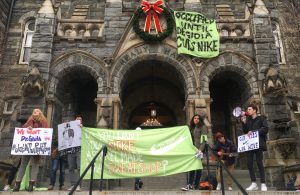The Office of Student Conduct affirmed sanctions placed on eight members of Georgetown Solidarity Committee (GSC) who participated in the sit-in in University President John DeGioia’s office last December to protest Georgetown’s relationship with Nike.
An appeals committee in the Office of Student Conduct rejected the appeal that the students filed on Feb. 1. In their appeal the students argued that the Letter of Administrative Action which they received from Dr. Jeanne Lord, associate vice president of Student Affairs, was a disproportionately severe response. The committee’s ruling, which was determined on Feb. 20, cannot be further appealed.
“The Appeals Committee considered all of the information you presented in your Statement of Appeal and determined that you failed to show, by clear and convincing evidence that the sanctions imposed by Dr. Lord were disproportionately severe to the level or nature of the offense as stated in the Sanctioning Guide for the above stated violations,” the committee wrote in an email to the students, which GSC sent to the Voice.
Whitney Maddox, judicial coordinator of the Office of Student Conduct, did not comment due to confidentiality concerns.
Additionally, the Speech and Expression Committee decided in its meeting on Jan. 31 that the students had been in violation of the Speech and Expression Policy, which prohibits protest in individual offices and protests in buildings after they close. As a result, the students were not protected from Code of Student Conduct sanctions by the Speech and Expression Policy. This decision came as a response to a complaint which the students filed to the committee on Jan. 17.
“The committee was in agreement that because of this, application of the student code of conduct did not violate your right to free speech and expression,” Todd Olson, vice president for student affairs, wrote in an email to the students which GSC sent to the Voice. “The committee also noted that the nature of civil disobedience carries with it the understanding that taking action to break rules to call attention to an issue carries with it the responsibility to accept the consequences associated with breaking those rules.”
Several faculty members supported the students’ appeal. Eight faculty members, including Joseph McCartin, executive director of the Kalmanovitz Initiative for Labor and the Working Poor, wrote a letter to the committee outlining a number of mitigating factors surrounding the students’ protest, which they believe should be taken into account. These factors, among others, included that the protest caused no damage, that the students had previously attempted to communicate with the university in conventional ways, and that such a severe response might have a “chilling effect” on future campus protest.
“In accepting the risk of personal sanctions for their respectful act of civil disobedience, these students helped galvanize the university community in defense of exploited workers on the other side of the world, one measure of which was a unanimous resolution from the faculty senate in support of the position they advocated,” the faculty members wrote in a letter to the appeals committee, which GSC sent to the Voice “In taking their stand, the students reminded our university community what it means to be true ‘women and men for others.’”
McCartin expressed his disappointment with the committee’s decision. “The real transgressor in this situation was Nike, which has decided to become a law unto itself on issues concerning workers’ rights internationally,” he wrote in an email to the Voice. He added that he believes that Nike’s actions have driven a wedge between student protesters and the administration
Students involved in the protest believed that the faculty’s response to the sanctions demonstrated that their protest was in line with the university’s values, said Kory Stuer (COL ‘19), one of the students who participated in the sit-in.
The implications of the university’s response for student activism are more concerning for some members of GSC than their specific sanctions. “We are disheartened and scared for the state of student activism on this campus, that they are bringing such severe sanctions against us,” Stuer said. “I think that as much as this is a really unfortunate consequence, this speaks to a potential future problem for students trying to make social justice more of a reality on this campus.”





